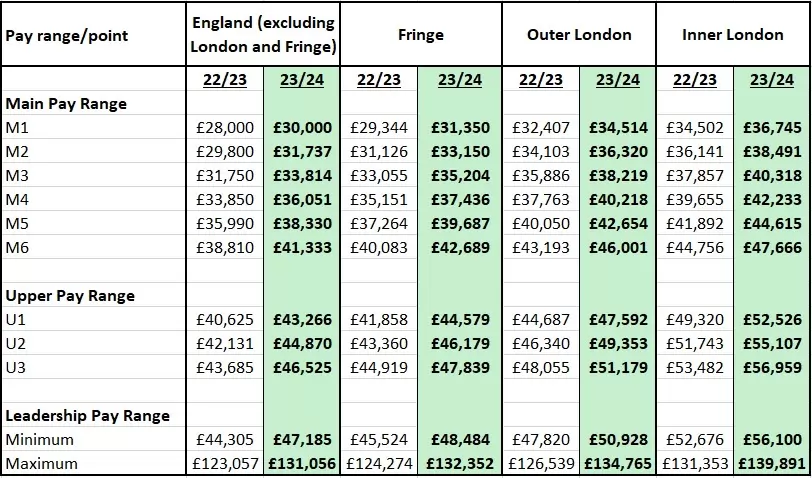Teachers offered a 6.5% pay rise: how it affects you

The Department of Education has fully accepted the Schools Teachers’ Review Body (STRB) recommendation of a 6.5% pay award across all pay scales.
From September 2023 teachers and school leaders in England will receive a pay award of 6.5%.
New teachers (Early Career Teachers) will also receive a minimum starting salary of £30,000 - delivering on their 2019 manifesto commitment.
This comes on top of the record pay rise in 2022/23 of 5.4% on average, meaning that over two years, teacher pay is increasing by more than 12% on average.
All four teaching unions currently in dispute with the government over pay - the ASCL, the NAHT, the NASUWT and the NEU - have said they will recommend that members accept the pay award.
In a joint statement, they said: “A 6.5% increase for teachers and school leaders recognises the vital role that teachers play in our country and ensures that teaching will continue to be an attractive profession.”
It is likely that each union will ballot members in a short electronic poll on whether to accept the new pay deal. Should members vote to accept the offer, strike action involving teacher members in the autumn term will not go ahead, the unions have said.
How can I work out my new pay?
The way school teachers’ salaries work means that each year around 40% of them progress up a scale to the next pay point. This means that these teachers will see even greater increases in their salary this year of at least 10% and up to 17.4%.
The below table contains the new minimum and maximum pay points for each pay range, which will apply from September 2023. All pay scales will benefit from a 6.5% rise, with the only exception being for those at the bottom of the main pay scale outside London and in the capital’s “fringe” – they will receive a slightly larger rise (7.1% and 6.8% respectively) so the government can meet its pledge to raise starting salaries to £30,000.
You can use a teacher pay calculator to work out what this could mean for your salary based on your current pay.

Is it a fully funded pay deal?
To help cover the uplift, the DfE will provide schools with additional funding to cover 3% of the rise.
Schools will benefit from an extra £525 million in the 2023-24 financial year and £900 million in the 2024-25 financial year. The DfE has emphasised its expectation that these additional funds will be allocated towards teacher pay, as intended.
To ensure the availability of these funds, the DfE plans to reprioritise its existing budget while safeguarding frontline services from any cuts. The allocated money will be provided to schools in the form of a grant.
While the government and unions refrain from labelling the deal as "fully funded," they assert that it is "properly funded." It should be noted that schools had already factored in a 3.5% pay rise in their budgets, which they believe they can afford due to the supplementary funding announced during last year's autumn statement.
Existing budget has been reprioritised to deliver this additional funding to schools, while ensuring core budgets remain protected. This means there are no cuts to core schools’ and colleges’ budgets, including SEND provision and funds for the early years' entitlements, and no cuts to allocations and programmes to address building safety.
Hardship fund
In addition to this the government has set aside a hardship fund of up to £40 million to support those schools facing the greatest financial challenges.
Education Secretary, Gillian Keegan said she recognised that the additional funding “will not mean that no school will face financial challenges and I will also extend the support currently available to individual schools facing the most difficult financial circumstances by up to £40 million”.
Workload reduction taskforce and flexible working
To ensure teaching remains an attractive profession and to help with recruitment and retention in the sector, the DfE has committed an ambitious target to reduce workload by five hours per week through a newly created workload reduction taskforce. The taskforce will embark on a comprehensive review of the issues faced by schools when managing workload and will propose effective solutions.
Taking another step further to promote a healthier work-life balance within the education sector, last month the DfE appointed seven Flexible Working Ambassador Multi-Academy Trusts and Schools to offer practical advice to school leaders on putting in place flexible working. This is part of a wider programme to embed flexible working in schools and trusts.
What happens if some unions reject the offer and vote to take further industrial action?
The government has said it will now refuse to enter into any further pay talks.
At a Downing Street press conference, prime minister Rishi Sunak said: “Today’s offer is final. There will be no more talks on pay. We will not negotiate again on this year’s settlements and no amount of strikes will change our decision.”
He said the accepted recommendations are a “fair deal for the British taxpayer”.
This achievement is another example of why teaching is one of the best jobs out there and why it’s so important to fix the recruitment and retention crisis in the education sector whilst protecting school budgets.
The rise in salary is substantial and will be a great help to teachers in the UK, especially considering that many teachers are face the rising costs of living.







